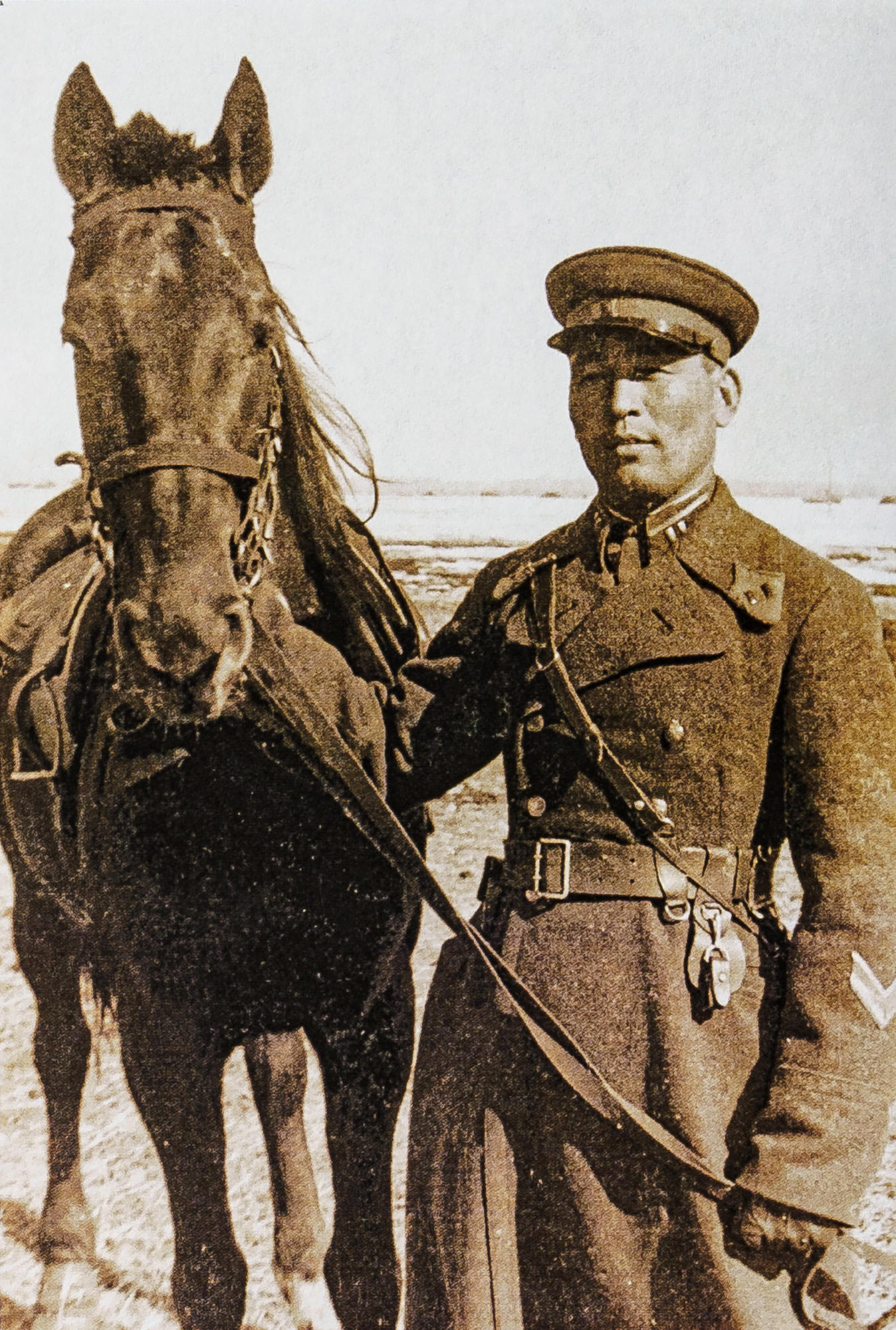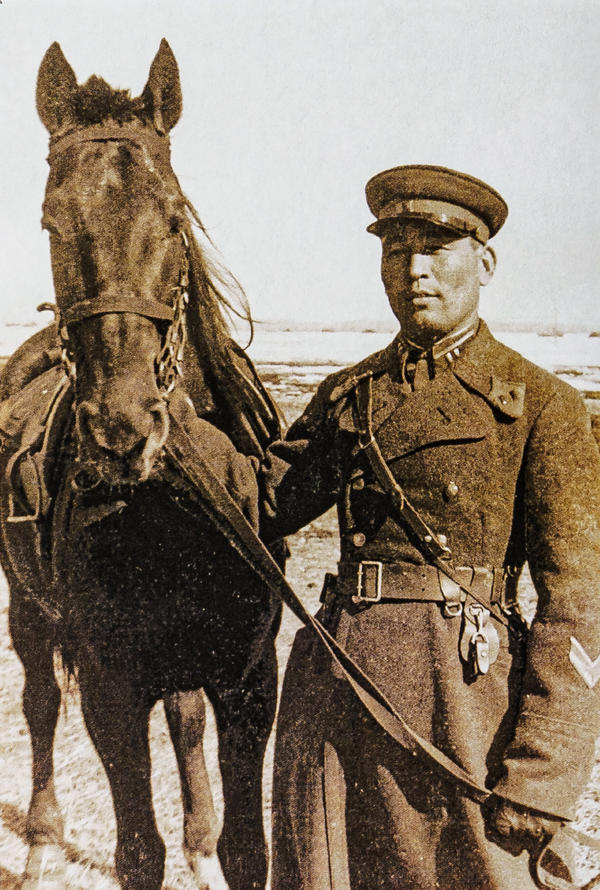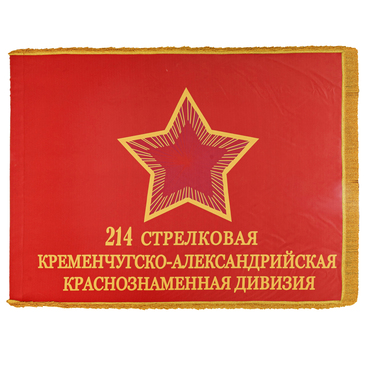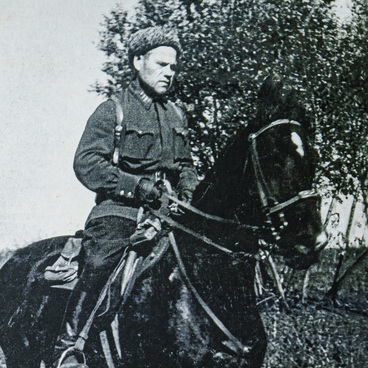Tagir Kusimov, Hero of the Soviet Union, is a career officer who started his career as an ordinary soldier. The service allowed him not only to master military skills, but also to continue his education. First, it was a correspondence Tatar-Bashkir school, then command courses. Tagir Kusimov made a brilliant career and at the beginning of the war, he rose to the rank of major. His unit was based in Transcaucasia, from where in April 1942 Tagir Kusimov went to the front and led the 275th regiment of the legendary 112th Bashkir cavalry division.
The brigade fought on the South Western and Central fronts and distinguished itself during forced crossing of the Snov, Desna and Sosnitsa Rivers. In the fall of 1943, the division showed resourcefulness when crossing the Dnieper – this operation became key to the liberation movement in the South-West. Thanks to well-thought-out tactics, Soviet troops were able to withstand the onslaught of the Germans, who hadn’t built temporary fortifications on the river bank.
The division’s units were transported by expedient crossing means. It is known that local residents helped soldiers build rafts to cross the Dnieper, which accelerated the pace of the operation. The landing of Soviet soldiers on the opposite bank was a complete surprise to the enemy, thanks to which German troops were knocked out of a bridgehead of about 2.5 km long. It is noteworthy that personnel losses in this operation were minimal.
For successful crossing of the Dnieper Tagir Kusimov was awarded the title Hero of the Soviet Union in January 1944. On the personal initiative of Semyon Budyonny, he was enrolled in the Frunze Military Academy, which he graduated with honors. After the war, Tagir Kusimov served in the North Caucasus and Turkmenistan Military Districts, while continuing to study. In 1951, he graduated from the Voroshilov Higher Military Academy, reinforcing his practical skills of managing military units with modern theoretical insights.
Tagir Kusimov’s active citizenship and non-standard judgments often caused discontent among the higher military authorities. But precisely because of these qualities, the major general earned respect among staff officers and soldiers. He was twice nominated as a deputy of the Supreme Soviet of the USSR, initiating reform in the army, as he understood that new technical means made it possible to organize state defense more effectively.
Tagir Taipovich himself often said that military mistakes are too expensive for people and the country as a whole. He personally became convinced of this during the Great Patriotic War, when his cavalry division was thrown against tanks. As an experienced commander, he understood that this was a certain death for all personnel and therefore set himself the task of minimizing losses at all costs.
Tagir Kusimov often spoke out against the term “cannon fodder, ” when human lives were sacrificed for great goals. This idea runs a “red thread” through his many essays published in the media and literary collections.
The brigade fought on the South Western and Central fronts and distinguished itself during forced crossing of the Snov, Desna and Sosnitsa Rivers. In the fall of 1943, the division showed resourcefulness when crossing the Dnieper – this operation became key to the liberation movement in the South-West. Thanks to well-thought-out tactics, Soviet troops were able to withstand the onslaught of the Germans, who hadn’t built temporary fortifications on the river bank.
The division’s units were transported by expedient crossing means. It is known that local residents helped soldiers build rafts to cross the Dnieper, which accelerated the pace of the operation. The landing of Soviet soldiers on the opposite bank was a complete surprise to the enemy, thanks to which German troops were knocked out of a bridgehead of about 2.5 km long. It is noteworthy that personnel losses in this operation were minimal.
For successful crossing of the Dnieper Tagir Kusimov was awarded the title Hero of the Soviet Union in January 1944. On the personal initiative of Semyon Budyonny, he was enrolled in the Frunze Military Academy, which he graduated with honors. After the war, Tagir Kusimov served in the North Caucasus and Turkmenistan Military Districts, while continuing to study. In 1951, he graduated from the Voroshilov Higher Military Academy, reinforcing his practical skills of managing military units with modern theoretical insights.
Tagir Kusimov’s active citizenship and non-standard judgments often caused discontent among the higher military authorities. But precisely because of these qualities, the major general earned respect among staff officers and soldiers. He was twice nominated as a deputy of the Supreme Soviet of the USSR, initiating reform in the army, as he understood that new technical means made it possible to organize state defense more effectively.
Tagir Taipovich himself often said that military mistakes are too expensive for people and the country as a whole. He personally became convinced of this during the Great Patriotic War, when his cavalry division was thrown against tanks. As an experienced commander, he understood that this was a certain death for all personnel and therefore set himself the task of minimizing losses at all costs.
Tagir Kusimov often spoke out against the term “cannon fodder, ” when human lives were sacrificed for great goals. This idea runs a “red thread” through his many essays published in the media and literary collections.



